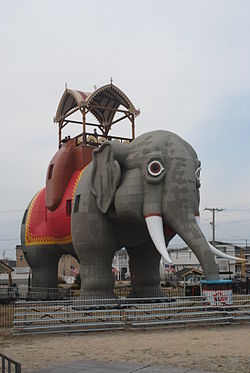Lucy the Elephant
|
Lucy, the Margate Elephant
|
|

Lucy the Elephant, National Historic Landmark, November 20, 2011
|
|
|
Location within Atlantic County. Inset: Location of Atlantic County within New Jersey.
|
|
| Location | Margate City, New Jersey |
|---|---|
| Coordinates | 39°19′14.33″N 74°30′42.85″W / 39.3206472°N 74.5119028°WCoordinates: 39°19′14.33″N 74°30′42.85″W / 39.3206472°N 74.5119028°W |
| Built | 1881 |
| Architect | James V. Lafferty |
| NRHP Reference # | 71000493 |
| NJRHP # | 383 |
| Significant dates | |
| Added to NRHP | August 12, 1971 |
| Designated NHL | May 11, 1976 |
| Designated NJRHP | April 7, 1971 |
Elephant hotel redirects here. For the National Historic Landmark located in Somers, New York, see Elephant Hotel.
Lucy the Elephant is a six-story elephant-shaped example of novelty architecture, constructed of wood and tin sheeting in 1881 by James V. Lafferty in Margate City, New Jersey, two miles (3.2 km) south of Atlantic City. Originally named Elephant Bazaar, Lucy was built to promote real estate sales and attract tourists. Today, Lucy is the oldest surviving roadside tourist attraction in America.
In 1881, the U.S. Patent Office granted James V. Lafferty a patent giving him the exclusive right to make, use or sell animal-shaped buildings for a duration of seventeen years. Lafferty funded the design and construction of his first elephant-shaped building at South Atlantic City, now called Margate. He employed Philadelphia architect William Free for the design, and it was constructed at a cost of $25,000 - $38,000.
Initially named Elephant Bazaar, the structure stands at 65 feet (19.7 m) in height, 60 feet (18.3 m) in length, and 18 feet (5.5 m) in width and weighs about 90 tons. It is listed as the 11th tallest statue in the United States. Lucy was constructed with nearly one million pieces of wood, and required 200 kegs of nails, 4 tons of bolts and iron bars; 12,000 square feet of tin covers the exterior. There are 22 windows placed throughout the structure.
Originally, Lafferty would bring potential real estate customers to the howdah (carriage) at the top, where he could point out parcels available for sale. Today,visitors to the roadside attraction may take guided tours through the building and access the howdah, which now serves as an observation deck, offering unique views of Margate, Atlantic City's skyline, the beach, and the Atlantic Ocean.
...
Wikipedia



